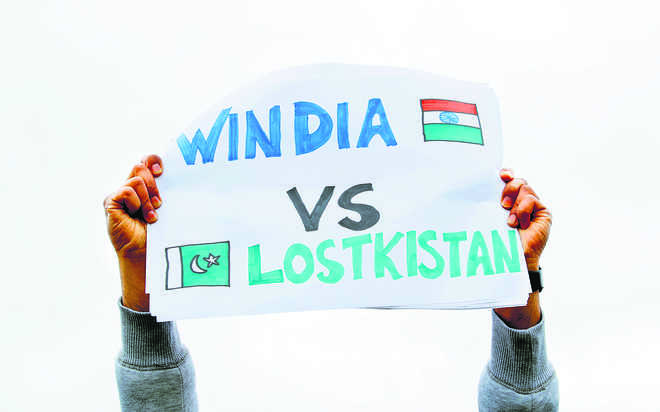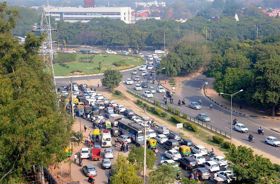
TUNNEL VISION: We see everything through the prism of nationalism. We do not love even cricket for its own beauty — unless, of course, India is winning.
AVIJIT PATHAK
Sociologist
EVEN though nationalism as an ideology is endowed with an immensely powerful politico-emotive passion, as an educationist, I have no hesitation in revealing its discontents. With my educational philosophy, as developed through a constant conversation with the ideals of Tagore and Krishnamurti, I see a blind attachment to the doctrine of nationalism (and simultaneous sanctification of the border and the Army, or for that matter, the chronic suspicion of the ‘other’ or the ‘enemy’) as a hindrance; it obstructs the flow of creative consciousness; and with some sort of group narcissism, it doesn’t allow the mind to be free, inclusive and accommodative.
And I feel an existential/pedagogic need to make this point because in contemporary India, as the trend indicates, militant nationalism as an ideology — backed by a narcissistic state, a deeply penetrated organisational network, and loud media houses—seems to have invaded our consciousness. The ‘victory’ of the nation with its militaristic/unitary mission has to be celebrated; and hence schools, colleges and universities, as the recent reports from Gujarat suggest, must celebrate the abolition of Article 370, and assert once again that ‘Kashmir is the integral part of India’, even if local Kashmiris are silenced, and forced to live in perpetual fear psychosis.
With one-dimensional nationalist thought, there is no other possibility of reimagining the world—the relationship between people, culture and land. Instead, all alternative voices are suspected, stigmatised and condemned as anti-national. The message is clear. Education must control the mind, and transform us into loyal/disciplined soldiers of the nation. This is dangerous.
As we internalise the collective ego of the nation, we begin to deprive ourselves of the finer faculties of learning, and appreciating diverse possibilities of life. Take, for instance, cricket. As we reduce cricket into some sort of war, and think that India must win at any cost, it becomes exceedingly difficult to appreciate good cricket—say, the creative skill of a Pakistani fast bowler who can somehow unsettle the likes of Virat Kohli. The fact is that we see everything through the prism of nationalism; we do not love cricket for its own beauty. Likewise, even techno-science becomes some sort of possession for the mighty nation-state and its gospel of nationalism. Hence, be it the surgical strike or the spectacular space research: everything must enhance the glory of the nation, and intensify the ego of its messiah. Furthermore, militant nationalism is inseparable from militarism. To accept it blindly is to promote an aggressive/totalitarian mind. It is like desensitising oneself. Hence, you should not bother about the agony of a Kashmiri Muslim because she/he has already been reduced to a number, an abstraction, an ‘enemy’ of the nation. The militaristic gaze has already robbed him/her of the human essence. Or for that matter, you cannot problematise the militarisation of the human consciousness—the way its techniques of discipline disempower the inner self, and negate even the slightest trace of reflexivity; or the way bravery is equated with hyper-masculine aggression.
It is not to say that there is something inherently wrong in one’s love for the local milieu one is born in. Yes, it is natural, spontaneous and almost instinctive. For instance, the river that flows through my village, the vast paddy field that I have been seeing since childhood, and the people around: the language they speak, the symbols they adhere to—I evolve a natural affinity. Slowly, I move from my village to the region to what Benedict Anderson would have regarded as the ‘nation as an imagined community’. And at times, there is a great degree of romanticisation in this imagination—say, the way Allama Iqbal once composed: Sare jahan se accha Hindustan hamara. However, the task of an educator is to transform this natural love as enabling, and take it to a higher realm with the fusion of horizons, rather than reducing it into some sort of constricted tribalism—my nation, my religion, my totem. The fact that I love the Himalayas should not prevent me from loving the Alps; or for that matter, the fact that I like the land that gave birth to Buddha and Kabir and Nanak does not prevent me from going deeper into the Greek mythology and appreciating the Gothic architecture. In other words, enabling patriotism is not necessarily in conflict with cosmopolitanism, something that Gandhi demonstrated so beautifully.
However, nationalism as a modernist ideology is based on the inflated ego of the nation-state, its techno-science and developmentalism, its militarism and cultural narcissism. No wonder, devastating war with utter abstraction and objectification of the enemy is its logical consequence. Today, we have begun to love the psychology of war.
I, therefore, plead for a kind of education that speaks of love, not war; feminine ethics of care, not militarism; fluid consciousness, not tight, closed and limiting identities. I know that in this age, when narcissistic leaders like Trump and Putin are around, globalisation becomes merely a game of the neoliberal market, and nationalism with implicit racism and communal frenzy is a hallucinating drug, it is difficult to reconstruct the edifice of education. Yet, only in the age of darkness does the search for the lamp of truth acquire its relevance. And I would continue to use the poetic metaphor that Tagore used to describe India as an oceanic confluence of multiple traditions.


























